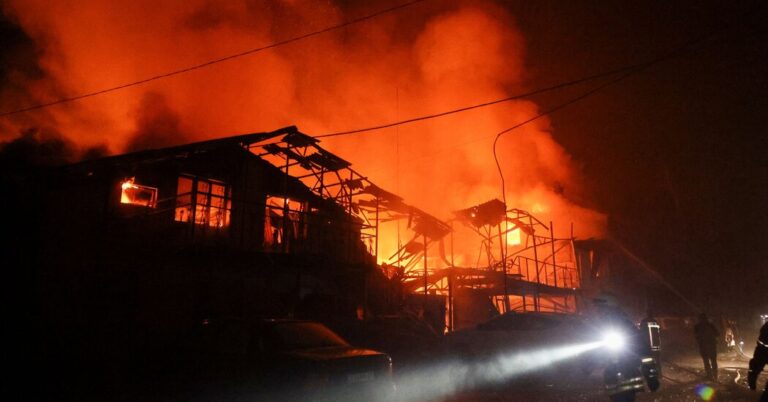Russian forces targeted Ukraine overnight with their biggest drone attack in weeks, part of what Ukrainian officials and military analysts say appears to be a campaign to wear down and probe Ukrainian air defenses ahead of winter.
Ukraine’s air forces said that Russia had used some 40 kamikaze drones and a cruise missile, adding that they had shot down the missile and more than half of the drones. Their account could not be independently verified. No casualties were reported, but local officials said that infrastructure facilities as well as residential and administrative buildings were hit by falling debris that caused large fires.
“As winter approaches, Russian terrorists will try to cause more harm,” President Volodymyr Zelensky of Ukraine said in a post on social media. His posts included a video of firefighters dousing a huge blaze. Mr. Zelensky said that air defenses had been at work in 10 regions, including in areas far from the front line, such as the western Lviv and Ivano-Frankivsk regions.
Data from the Ukrainian military shows that Russia has recently increased its drone assaults against Ukraine, targeting it with nearly 650 Iranian-made Shahed drones in the past two months, compared with about 450 in July and August.
Military analysts and Ukrainian Army officials have said that the attacks are probably aimed at testing Ukrainian air defenses as winter looms, ahead of what the Ukrainian authorities have warned will be another Russian air campaign against the country’s energy grid.
Yuriy Ihnat, a spokesman for the Ukrainian Air Force, said on national television last week that Russian drones were maneuvering across the country to determine where they can most easily break through air defenses. “This allows the enemy to draw conclusions about the forces and means in a particular region and take this information into account when planning future attacks,” Mr. Ihnat said.
Ukraine has a limited number of air defense systems at its disposal, meaning that some areas of the country are better protected than others. While Kyiv, the Ukrainian capital, has withstood most attacks this year thanks to powerful Western-supplied Patriot surface-to-air missile batteries, other cities have proved more vulnerable.
On Friday, Oleh Synehubov, the governor of Kharkiv, Ukraine’s second-biggest city in the east, said that drone attacks had partly destroyed a school, a car repair shop and a residential building. In the west and south, local officials said Russian drones had hit several facilities.
The drone assaults are also forcing Ukraine to burn through expensive stocks of surface-to-air missiles to shoot down Shahed drones, which are relatively cheap.
Andriy Yermak, the head of Mr. Zelensky’s office, noted on Friday that a greater number of Shahed drones had been involved in recent air attacks. “The battle for the sky is what awaits us,” he said.
Ukraine has used its own fleet of cheap, mostly off-the-shelf drones to evade and target sophisticated Russian air defense systems.
Rybar, a Russian military blogger who has closely tracked the war, said on Friday that 15 Ukrainian drones had been launched overnight at Crimea, the peninsula that Moscow illegally annexed in 2014 and that has increasingly been targeted by Ukrainian forces this year. His account could not be independently verified.
In an essay published this week, Gen. Valery Zaluzhny, the chief of Ukraine’s armed forces, stressed the need to improve drone technology in order to break what he described as a “stalemate” in the war.
General Zaluzhny’s sober assessment of the state of the fighting has prompted debate in Ukraine, with some officials calling for a change in tactics. On Friday, Mr. Zelensky dismissed the head of Ukraine’s special operations forces, Gen. Viktor Khorenko, and replaced him with Col. Serhii Lupanchuk. The announcement did not offer details about Colonel Lupanchuk’s background, and it is unclear whether the change was linked to General Zaluzhny’s comments.
Still, what worries many people in Ukraine at the moment is not the increase in Russian drone assaults, but the drop in missile strikes. Russia fired only 24 missiles at Ukraine last month, about a quarter of the monthly number fired in September and August, according to the Ukrainian air force.
That has stoked fears that Moscow is saving its stockpiles of missiles to pound Ukraine’s power stations and heating systems when the winter cold starts to bite. “It’s disturbing — they are saving their forces, their power to start some really big shelling,” said Iryna Zadorozhna, 30, a resident of Kyiv.
Bracing for new assaults, Kyiv has in recent weeks secured several promises from European leaders to send more air defense systems. Germany and the Netherlands said last month that they would provide Ukraine with more Patriot systems.
Daria Mitiuk contributed reporting from Kyiv.

